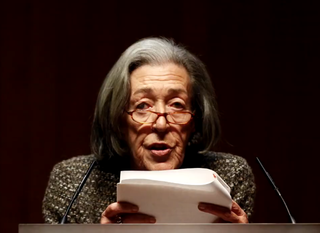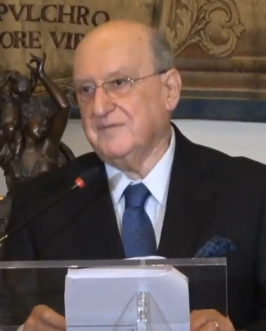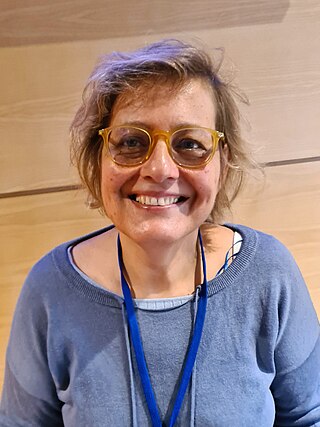Related Research Articles

Sophia de Mello Breyner Andresen was a Portuguese poet and writer. Her remains have been entombed in the National Pantheon since 2014.

Lídia Jorge is a prominent Portuguese novelist and author whose work is representative of a recent style of Portuguese writing, the so-called "Post Revolution Generation".
Maria Teresa de Mascarenhas Horta Barros is a Portuguese feminist poet, journalist and activist. She is one of the authors of the book Novas Cartas Portugesas, together with Maria Isabel Barreno and Maria Velho da Costa. The authors, known as the "Three Marias," were arrested, jailed and prosecuted under Portuguese censorship laws in 1972, during the last years of the Estado Novo dictatorship. The book and their trial inspired protests in Portugal and attracted international attention from European and American women's liberation groups in the years leading up to the Carnation Revolution.

Maria de Fátima de Bivar Velho da Costa was a Portuguese writer who was awarded the Camões Prize in 2002. She took part in the Portuguese Feminist Movement, and became one of the authors of the book Novas Cartas Portugesas, together with Maria Teresa Horta and Maria Isabel Barreno. The authors, known as the "Three Marias," were arrested, jailed and prosecuted under Portuguese censorship laws in 1972, during the last years of the Estado Novo dictatorship. The book and their trial inspired protests in Portugal and attracted international attention from European and American women's liberation groups in the years leading up to the Carnation Revolution.
Menez or Maria Inês Ribeiro da Fonseca, GOSE was a Portuguese painter. Her major body of work consists of paintings and drawings but she also produced ceramics, engravings, silk-screen prints and tapestries.
First Lady of Portugal is the unofficial title attributed to the wife or Partner of the president of Portugal. To date, there has been no first gentleman of Portugal. The current First Lady is Rita Amaral Cabral, Partner of president Marcelo Rebelo de Sousa.
Georgina Maria Augusta Benrós de Mello is a Cape Verdean economist and former director-general of the Community of Portuguese Language Countries from 2014 to 2020.
Djaimilia Pereira de Almeida is a Portuguese novelist and essayist of partial African descent. She was born in Luanda, Angola, in 1982, but grew up near Lisbon. She completed a PhD in literary theory from the University of Lisbon. She is the author of Esse Cabelo [That Hair],Ajudar a cair, Luanda, Lisboa, Paraíso, Pintado com o pé and A visão das plantas. Her writing has appeared in granta.com, Blog da Companhia das Letras, Granta Portugal, Serrote, Zum, Pessoa, Ler, Buala, and elsewhere. She is a contributor for the Brazilian magazine Quatro Cinco Um.

Maria Lamas was a Portuguese writer, translator, journalist, and feminist political activist.

Maria Antónia Palla is a journalist, writer and feminist who was one of the first female journalists in Portugal. She played an important role in the legalization of abortion in the country, by promoting the practice in interviews and television programmes. In 2004 Palla was awarded the title of Commander of the Order of Liberty. She is the mother of António Costa, the current Prime Minister of Portugal.

Manuel Henrique de Melo e Castro de Mendonça Corte-Real is a Portuguese diplomat and historian.
Ana Martinho was, until 2017, Head of the Portuguese Diplomatic Service. She was the first woman to hold this position. In 2017, she was appointed to be the advisor on International Relations to the Portuguese President.
Rita Ferro is a Portuguese diplomat who has been Portugal's ambassador in Tunisia, Luxembourg and Morocco. At the beginning of 2020 she was appointed to be the ambassador to the Community of Portuguese Language Countries.

Berta Nunes is a Portuguese doctor and politician. She was mayor of the city of Alfândega da Fé in the northeast of Portugal and in 2019 was appointed as Secretary of State for Portuguese Communities, with responsibility for the Portuguese diaspora.
Isabel Jonet is the current president of the Federação Portuguesa dos Bancos Alimentares Contra a Fome and the founder and a director of ENTRAJUDA, a charity that supports other charities in areas such as management and organization. She was chair of the board of directors of the European Federation of Food Banks between 2012 and 2017.
Maria da Conceição Zagalo was a leading Portuguese business executive, who plays an important role in promoting Corporate Social Responsibility, executive volunteering, women's leadership and youth leadership development in Portugal. Between 2017 and 2020 she was also a Lisbon City councillor.
Irene Flunser Pimentel is a Portuguese historian who concentrates on the study of the 20th century in Portugal, particularly during the time of the Estado Novo regime, with particular reference to the experiences of women.

Diana AndringaGColL, is an Angola-born Portuguese journalist, columnist, documentary filmmaker and producer. She is best known for co-directing the Guinea-Bissau film The Two Faces of War along with Flora Gomes.

Isabela Figueiredo, is a Portuguese journalist, teacher, and writer.
Maria de Jesus Trovoada dos Santos is a biologist and politician from São Tomé and Príncipe, who is known for her research on human genetics. She was appointed Minister of Health to the XVI Constitutional Government of São Tomé and Príncipe in 2014.
References
- 1 2 3 "Clara Nunes Santos vem da Noruega para tomar conta do Protocolo do Estado". Visão SAPO. Retrieved 2 April 2021.
- 1 2 3 "Decreto 7/2019, de 18 de Fevereiro". Diário da República. Retrieved 2 April 2021.
- 1 2 3 "Chefe de Protocolo de Estado nas XII JIP". APorEP -Associação Portuguesa de Estudos de Protocolo. Retrieved 2 April 2021.
- ↑ "Embaixadora Clara Nunes dos Santos distinguida com o Prémio Femina de Honra". Diário de Notícias. Retrieved 2 April 2021.